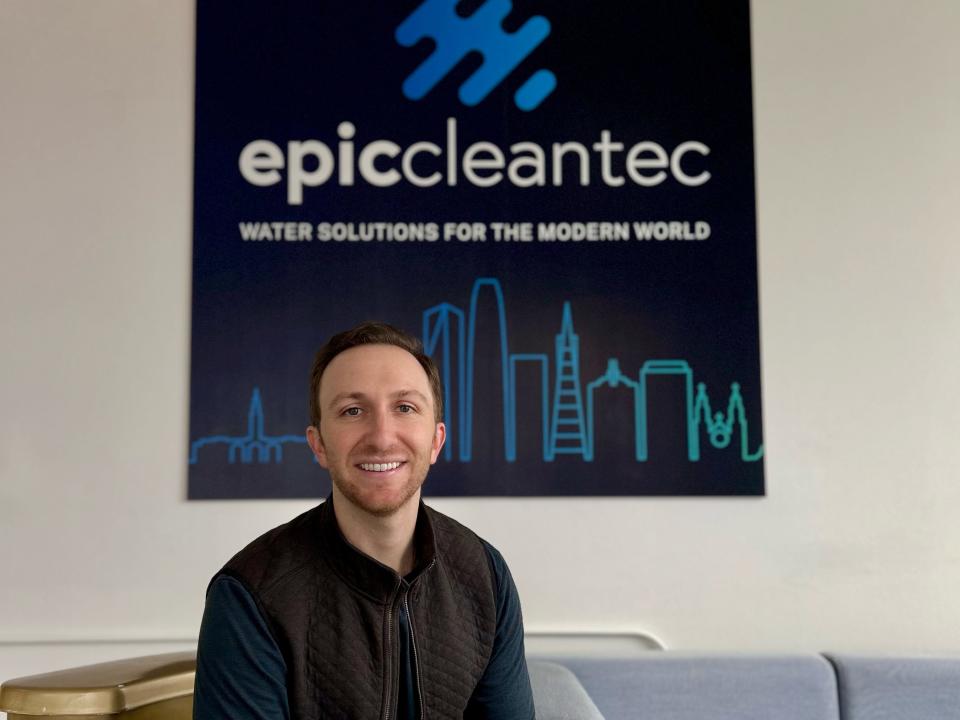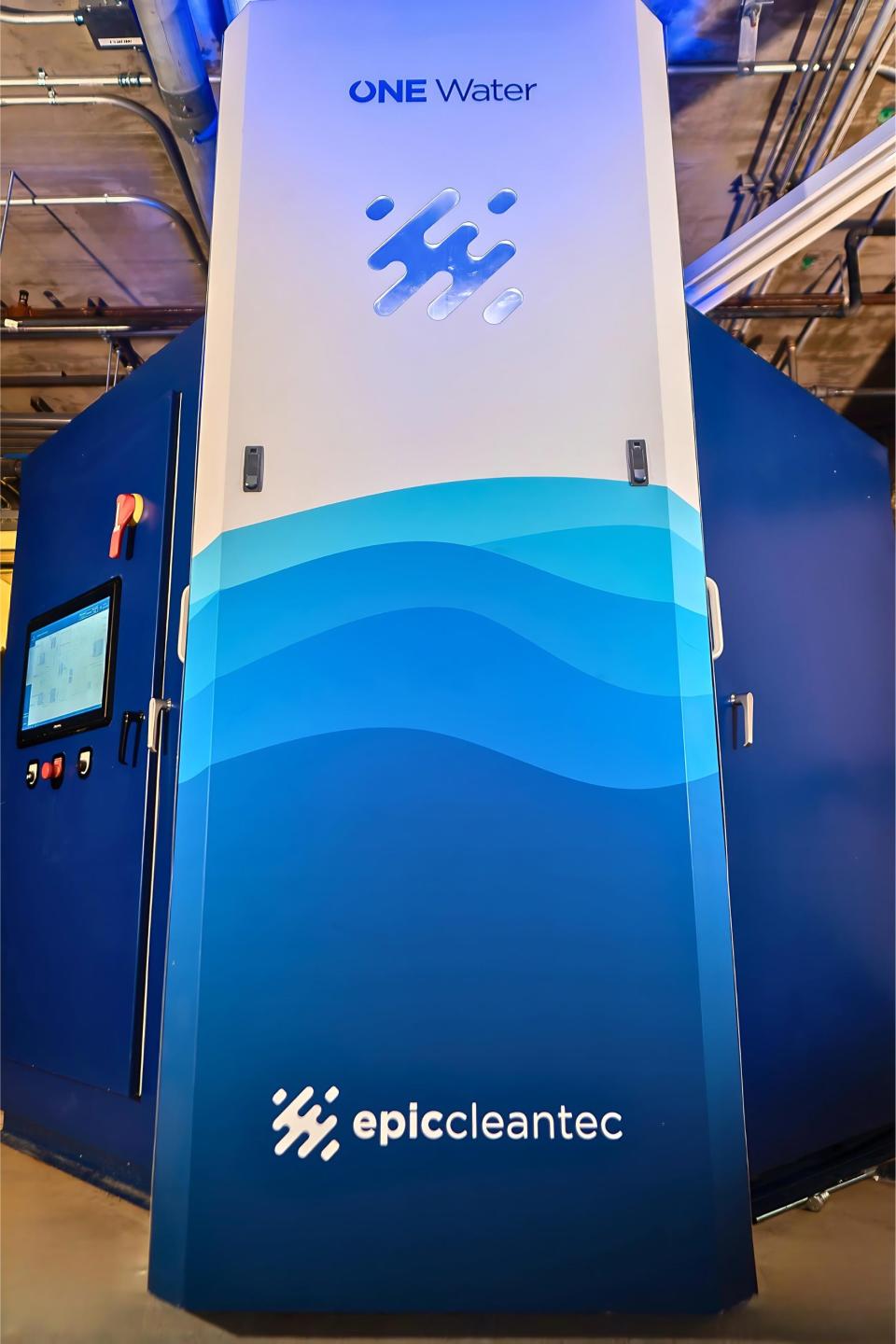Droughts are threatening California's water supply. The state is racing to save what's left.
California has spent decades battling droughts and water insecurity.
Startups like Epic Cleantec are innovating with on-site water reuse.
This article is part of "Transforming Business: Infrastructure," a series exploring the advancements reshaping US infrastructure.
Despite enduring droughts for much of the past 15 years, California continues to lead the nation in water consumption.
During these dry periods, some of the state's local governments began to look for ways to diversify their water supplies away from lengthy pipelines and expensive, out-of-state sources.
In 2012, San Francisco's Public Utilities Commission began developing the Onsite Water Reuse Program to investigate whether water reuse, also known as water recycling, in buildings could be a solution to California's water problem.
"There weren't any state or national regulations," Paula Kehoe, the director of water resources at the San Francisco Public Utilities Commission, told Business Insider. Kehoe and her team created a permitting program to streamline the adoption of on-site water-reuse systems developed by private businesses.
As the US faces a $625 billion cost to address the nation's need to repair drinking- and clean-water infrastructure, on-site water reuse is quickly becoming a strong alternative to the historically slow and expensive process of building large water-recycling plants.
With droughts predicted to reduce California's water supply by 10% over the next 20 years, the success of these systems could lay the foundation for how the state sources its water over several decades.
Silicon Valley is investing in on-site water recycling
In 2015, during the height of California's drought and after three years of development, San Francisco unveiled the Onsite Water Reuse Program requiring all new buildings of 250,000 square feet or more to install an on-site water-treatment system for nonpotable uses, a cap that was lowered to 100,000 square feet in 2021.
The city's tech background and proximity to Silicon Valley gave some startups an opportunity to enter the market. In 2019, Epic Cleantec, a maker of on-site water-reuse systems, emerged to meet the necessary demand for new large buildings.
Aaron Tartakovsky, Epic Cleantec's cofounder and CEO, developed the company to address the water-reuse needs of large city buildings.
He told BI he took inspiration from the solar industry, which he said had turned to local installation projects after prioritizing large-scale solar-panel farms. "Can we do the same thing for water and wastewater?" Tartakovsky said. "Can this be water's solar moment?"

Epic Cleantec's on-site systems can recycle building gray water for nonpotable uses, including toilet flushing and irrigation, through their filtration and disinfection process. The company's systems also incorporate an energy-saving mechanism to limit the amount of wasted heat.
"We have big tanks in these buildings that are collecting all this heated wastewater," Tartakovsky said. "Rather than just sending all that heat away, we are using heat exchangers to take all of that energy from the water and then to reuse that energy within the building."
Epic Cleantec has six active projects in California, including a recent system in San Francisco's Salesforce Tower that the company says is the largest on-site water-reuse system in a US commercial high-rise.
The company has also entered the hotel sector with a recycling system in the Waldorf Astoria Hotel in Beverly Hills. Recycled water is being used for on-site irrigation.
In a drought-conscious state, Tartakovsky said the on-site recycling systems had become more appealing to tenants looking for ways to contribute to the state's water-conservation mindset.
The adoption of on-site water reuse can also be a sensible decision for developers. "They're not working with us just because it's a nice thing to do and it's good for the planet," he said. "They're doing it because it makes business sense — it saves them a lot of money to incorporate technologies like ours into these projects."
Water reuse to overcome hurdles
While large plants and on-site water systems in major buildings have been California's more established methods of water reuse, the state's biggest hurdle is retrofitting systems for existing buildings.
As part of San Francisco's water-recycling initiative, the city published a list of 30 vendors that provide on-site systems that can be installed in existing buildings and new constructions to collect different types of water, including rainwater, gray water, and black water.
While most of the vendors offer reuse systems and water management for new constructions, some companies, such as Bioclere, Phoenix's Aquacell, and Innovatreat, make systems designed to be retrofitted into existing buildings and community infrastructure.

Erik Porse, the director and associate cooperative extension specialist at the California Institute for Water Resources, told BI these retrofits are more difficult to install because of the limitations of size and existing water pipes. "If you have a larger facility, like more area, then you can think about on-site treatment of some sort," he said. "But if you're kind of working in an existing building, like a small building, it can be kind of tough to integrate in lots of treatments."
California's agriculture sector also relies on water-reuse systems for nonpotable water — a key part of crop irrigation. Since the state has the highest agricultural output in the country, recycled water is important for maintaining crops, especially in times of drought. California is the leader in using reused water for agriculture across the US.
However, the extent to which recycled water is used in agriculture depends on a state's guidelines, many of which are underdeveloped. For example, Iowa is one of the highest producers of crops but does not have any regulations for the use of reused water in agriculture. Instead, the state is experimenting with drainage-water recycling, or collecting water from farming, and local infrastructure that captures used drainage and rainfall for reuse in on-site irrigation.
Nonpotable water can also help in one of the country's newest sources of water loss: data centers. States like Iowa and Virginia have seen massive strains on their water supplies due to the increased construction of these facilities. "Those data centers use huge amounts of water to cool themselves," Tartakovsky said.
Tartakovsky hopes Epic Cleantec's recent expansions to states such as Texas, Florida, and Hawaii can help in ways beyond water scarcity. "A lot of people think you only need it in the Western states, but in places like the East Coast, a lot of times what they have is wastewater-infrastructure issues," he said. "We have pipes and sewers that were put in place anywhere from 30 to 100 years ago."
Rethinking our relationship with water
To help promote the safety of its recycled water, Epic Cleantec partnered with a brewery near San Francisco, Devil's Canyon Brewing Co., to make a safe-to-drink beer out of its nonpotable water. The beer could not be sold commercially since the state has not cleared nonpotable water for drinking, but Tartakovsky credits the campaign with highlighting the company's purification process.
Other states could learn from the public-awareness campaigns California has promoted for several decades to help residents embrace water reuse. During times of drought, the state has encouraged water conservation and water recycling, such as the use of recycled water for plants. "We've seen a pretty big evolution in California cities, especially in Southern California, that folks understand that water reuse is a treatment technology that we use in the state, and it's important, and it provides supply resilience," Porse said.
In Texas, a fellow drought-prone state, the Take Care of Texas campaign similarly encourages community support for water conservation so the state can survive in times of water scarcity.
Porse told BI that in California as public support grows, so will government regulations. In 2023, California made progress toward establishing recycled water for direct potable reuse and allowing recycled water to be used in the state's drinking-water supply.
For Kehoe, the key to creating stronger water infrastructure is a partnership between communities that endures beyond times of scarcity.
"We always talk about water conservation as a way of life," Kehoe said. "It's not just during the drought."
Read the original article on Business Insider

